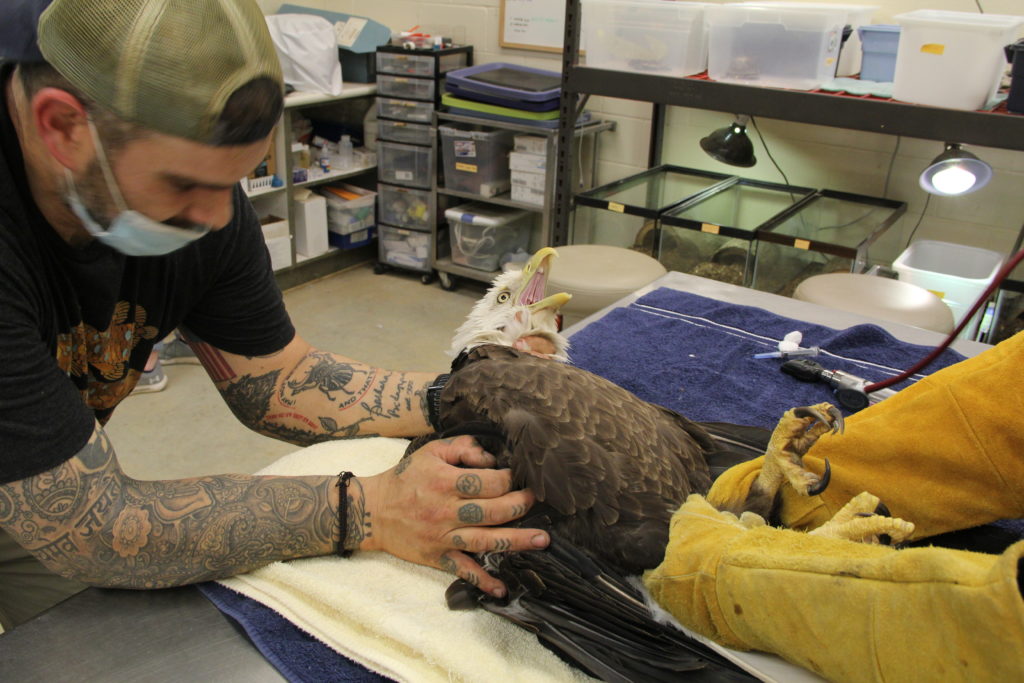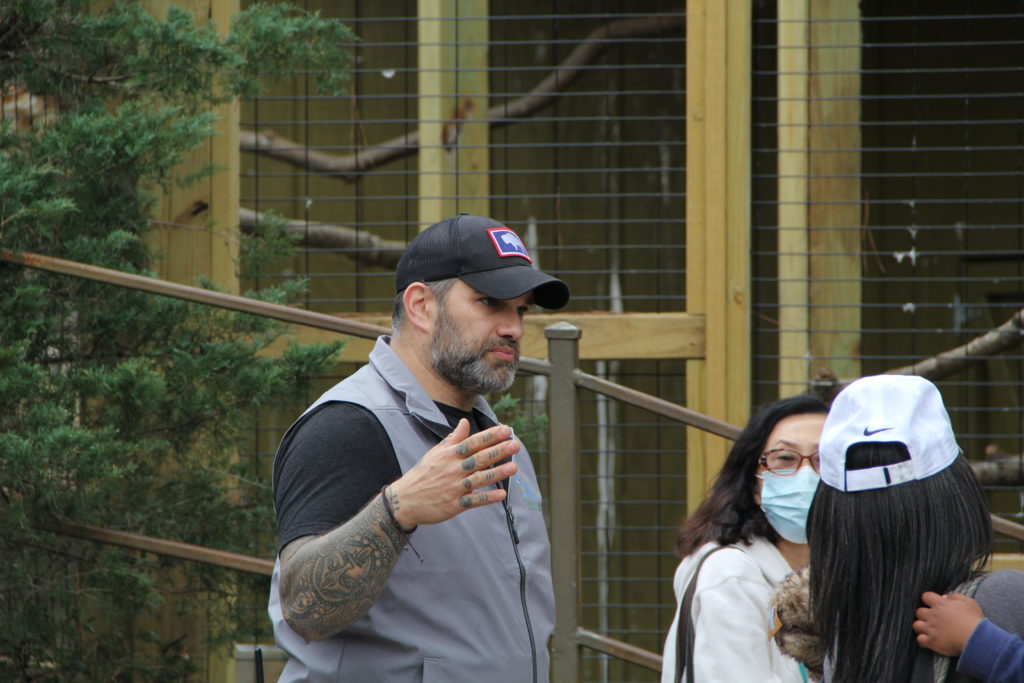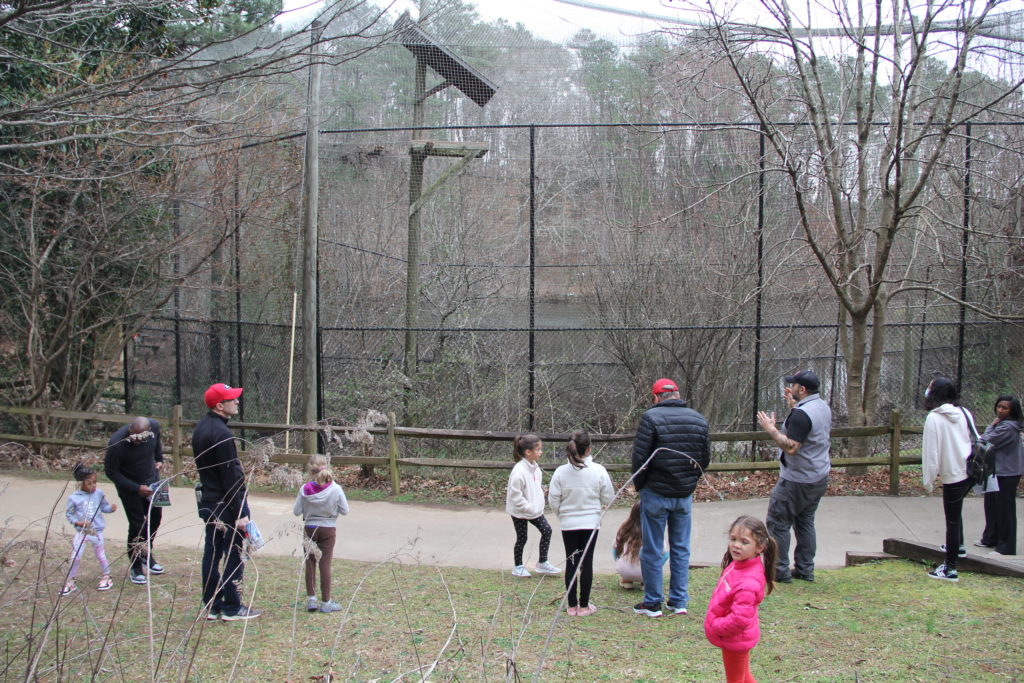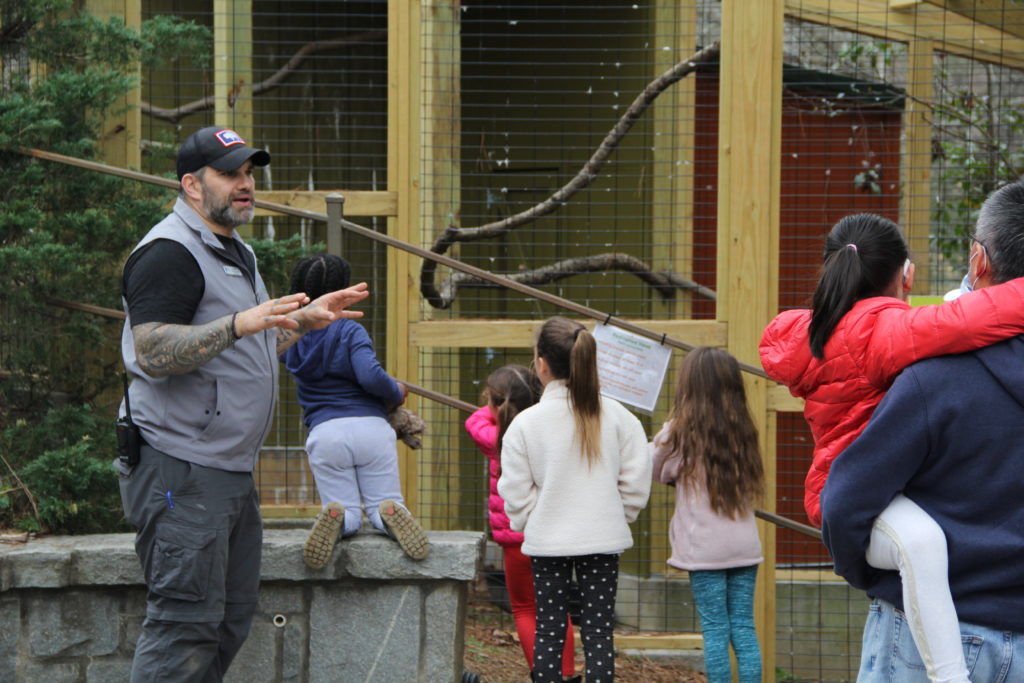New Wildlife Technician Joins the CNC Team
Join us in congratulating Wildlife Technician Jeremy Maneyapanda on passing the GA Department of Natural Resources Rehabilitation exam for raptors and reptiles.

Jeremy Maneyapanda joined the Chattahoochee Nature Center Wildlife Rehabilitation Department less than a year ago and he has been a wonderful addition to the team. He has had a love of animals since he was a kid and he has worked professionally in animal care and husbandry for many years.
Learn more about Jeremy and what led him to CNC!
What sparked your interest to work with animals?
Ever since I was a kid, I always wanted to work with animals. I graduated from Cornell University in 1997 with a BS in Biological Sciences in Ecology and Systematics, under the guise of going to Vet school thereafter. However, 4 years of college took its toll, so I opted to get a job at the Buffalo Zoo as an animal keeper. It blossomed from there. Worked at Buffalo Zoo for 4 years, working with every species in the zoo. I moved to Georgia in 2001 and was Facility Manager at Kangaroo Conservation Center until 2012. They were an AZA-accredited zoological facility that operated as an attraction, farm, and exotic animal facility. Aquariums were always a passion of mine, so I moved into the professional aquarium industry in 2012 until my time started here.

Why did you become a volunteer at CNC?
While working in the aquarium industry, I started volunteering at local organizations, such as the Atlanta Humane Society, Children’s Hospital, and Winship Cancer Institute at Emory. However, my schedule changed and these places did not offer volunteer opportunities on weekends. One day while working for the aquarium business, we got a call from Henning and Kathryn regarding servicing a pump on the River system in the Discovery Center. In conducting this service, I was able to chat with Kathryn about what the Center does, its philosophy, and actually how similar this type of job was to my work experience. It only made perfect sense for me to then decide to volunteer here, as weekends were an option for me.
Was there a specific thing that made you want to go from volunteer to wildlife technician on staff?
Bluntly, the aquarium industry was not very personally fulfilling. It involved a lot of sales and certainly did have aspects of husbandry involved, but it took an emotional debt for sure. I had certainly missed working hands-on with exotic animals and their care. In volunteering, Kathryn happened to mention in passing the opening for Wildlife Technician, and I casually responded that if another opening ever occurred, to let me know. About a week later, she sent a text asking me to submit a resume.

Can you share some of the requirements for becoming a licensed raptor and reptile rehabilitator?
First and foremost, any wildlife rehabilitator must get the proper licensing and permits from the Georgia State Department of Natural Resources. This process is a great primer for making sure that someone would understand the nuances of wildlife care and rehabilitation. Furthermore, it is the law to get such permits. There are a lot of very caring, philanthropic people who really want to help wildlife, but in situations like this, there are too many details, requirements, and technicalities that most people cannot accommodate. Luckily, CNC has an outstanding, state-of-the-art facility ideal for rehabilitating and caring for these animals. In addition to the extensive credentials and experience of the staff, the contacts, consulting professionals, and facility capabilities make this rehabilitation best prepared for success in that task. We are always learning and honing our skills to be better at what we do!
What are some of the challenges of being a licensed rehabilitator?
It is certainly a lot of hard, subjective work. I think a lot of people have a misconception that our job is a lot of playing with animals. I often tell people, we usually do not see healthy animals to start. We get in wildlife in need of rehabilitation. From injury, trauma, natural events, or even human involvement. And unfortunately, we don’t speak their language and they don’t speak English! They don’t celebrate holidays or birthdays or weekends, and if a problem arises, we need to act, no matter what time, day, or condition. Wild animals, by nature, hide their injuries and illnesses to not be targeted by predators. So this is where the subjective, analytical, problem solving aspect of our job comes into play. We must figure out what’s wrong, calculate a plan for recovery, enact it, monitor it, adjust as needed, and monitor as we go. Our job is to try to help them recover fully, so that they may released to the wild, and then continue their bloodlines by reproducing. Sadly, this is not always successful. As we see animals in their worst state, some animals require us to humanly release them from their injuries and suffering. Some, we try our best to rehab, but our efforts aren’t enough. It is an, unfortunately, a requirement of our job that we are prepared for any situation, and any outcome.

What do you look forward to when you come to work each day?
I am very lucky to have two great colleagues to learn from and work with, Kathryn and Dawn. I learn from them every single day. I’m pretty sure we bounce thousands of questions and scenarios off each other every day in order to come up with a good consensus on the dilemma at hand. However, probably the greatest thing for me to experience as a rehabilitator is the actual release of animals. I’ve spent the past 25 years caring for animals in captivity. Trying to make their lives as best they can be in captive care. But, it wasn’t until coming here that I discovered the enormous final step in this care; in releasing a healthy animal back to its home. The sense of joy and well-being that comes from this is quite astounding. Animals will always be held in captivity, oftentimes out of necessity. And we will always do them right by providing the best care possible. But, in the event, the animal is rehabilitated, and then released to thrive, breed, and return to nature, I get an immense fulfillment from that.
What would you tell someone that has a love for animals and is interested in rehabilitation?
Certainly, get your foot in the door working with exotics and animals care and their medicine. This may be through formal education, volunteering at a facility or vet clinic, or even just self-involved education like reading. This is the greatest way to actually experience the ups and downs of what this path is like, and whether or not it’s a realistic fit for you.
